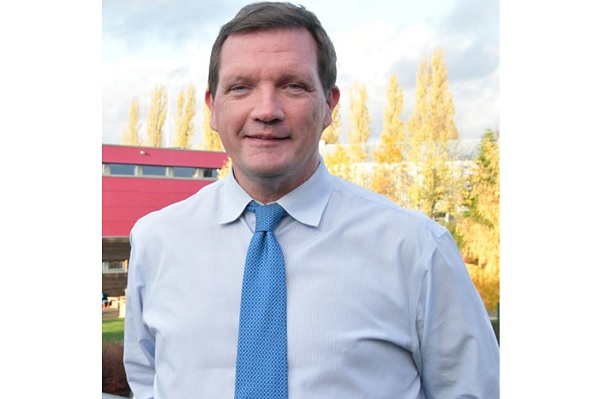 Dr Christian Barkei, Principal;
Credit: St George's International School Luxembourg
Dr Christian Barkei, Principal;
Credit: St George's International School Luxembourg
In an interview with Chronicle.lu, Dr Christian Barkei, Principal of St George's International School Luxembourg, shared what changes have been made in the school regarding COVID-19 since the start of the 2021/2022 academic year, as well as what 2022 has in store.
Changes in 2021/22
Concerning what has changed since the previous school year, Dr Barkei explained: "Essentially we critically reviewed all our procedures in place in 2020/2021 at the end of the academic year and decided that we would keep a large number of them in place". He noted that such measures included increased hygiene, temperature checks and reduced numbers in the canteen.
"We also decided that at the beginning of this school year we would keep mask-wearing in school in Year 2 and above as a precautionary measure until we had had a period of time back in school without any active cases", he added.
Hygiene & Safety
Discussing the school's hygiene and safety concept in more detail, Dr Barkei stated: "We firstly had general mask-wearing for all students in Year 2 and above and all staff, parents and visitors in place from 1 to 20 September and then again from 22 November until now in all inside areas. The re-introduction of masks at the end of November was a preventative measure taken in view of the generally rising COVID numbers in Luxembourg".
"We also utilise temperature checks for all students and staff using remotely installed cameras at all entrances to the school. This is something we have been using since 2020. We also have a large number of hand sanitisers around school which we encourage all students and staff to use on a regular basis", he continued. "As a third measure we have in all classrooms and offices CO2 level sensors installed linked centrally to our security system. These indicate when levels of CO2 are too high and a member of staff is promptly reminded to open a window and ventilate the room. We also remind colleagues to clean and disinfect teaching rooms whenever there is a change of class; this also applies to specialist teaching rooms; we also have a number of cleaning staff on duty during the day who follow a comprehensive rota of ensuring all public areas and rooms are disinfected".
Regading testing, he noted: "We have of course also testing three times a week for primary students and twice a week for secondary students and all staff. We have also reduced by 50% our canteen capacity since we re-opened our canteen, and have numbered seating for all students, as well as clear Perspex screens to separate smaller tables (four students maximum at one table) as well as reducing the number of choices available to students to avoid crowding".
He added: "Essentially we want to keep the school community as a whole healthy and safe – whether that is administrative or teaching staff, students and parents".
Lessons Learned
When asked whether this school year has been disrupted (so far) less than the previous one, Dr Barkei stated: "We are firstly very grateful indeed for the active support and encouragement from the Ministries of Health and Education both last year and this year so far. We particularly appreciate the ample provision of the rapid test kits and the active collaboration between our school and the civil service teams and units in the Ministries. These test kits and the different scenario modelling have allowed us to manage the continuing pandemic in a safe and appropriate manner. The nation-wide vaccination campaign has also helped immensely in affording staff and secondary students a higher level of protection".
In terms of lessons learned (in terms of COVID-19) from the previous school year, he explained: "In a sense last year allowed us to put in place a number of hygiene procedures and measures that we are still utilising or that we can draw upon if needed. One example is the ability to provide remote learning for all our students very quickly if we need to. All our staff (from often very different skill levels) have worked incredibly hard to make online learning work; and that is a great achievement".
New Year
As for what 2022 has in store for St George's International School Luxembourg, Dr Barkei noted: "As in the past we have found the most effective approach to deal with this pandemic is to work in a positive and very collaborative manner with the Ministry of Health and Education and also our own school community; we try to be as open and transparent as possible in these circumstances. We are confident that our previous experiences will serve us well in dealing with the challenges and opportunities of 2022! We will continue with our health and hygiene measures to ensure our school community remains as healthy and as safe as possible".
Regarding his vision for the school in the new year, Dr Barkei said: "I would be delighted to be able to have our very popular summer fayre happen again, and for our students and teachers to be able to perform in front of packed audiences in our auditorium. I also look forward to our students undertaking residential and educational trips again next year!"
St George's International School Luxembourg opened its doors in 1990. At the start of the 2021/2022 academic year, the school represented a community of over 850 students aged 3 to 18 of more than 60 nationalities.








